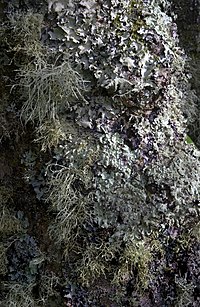
Photo from wikipedia
Simple Summary Water deficit is the main challenge that has a negative impact on plant physiology and yield production. Moreover, the increased use of chemical fertilizers has a negative impact… Click to show full abstract
Simple Summary Water deficit is the main challenge that has a negative impact on plant physiology and yield production. Moreover, the increased use of chemical fertilizers has a negative impact on the groundwater and ecosystem. The current study investigates the efficacy of two algal extracts versus two commercial algal products to decrease the effect of drought stress on wheat plants under field experiment conditions. The morphological characteristics (shoot length, shoot fresh and dry weight), metabolite contents (chlorophyll, carotenoids), carbohydrate contents, protein contents, and antioxidant enzymes (peroxidase, superoxide dismutase, and polyphenol oxidase) were estimated after two stages and compared with unstressed plants. Moreover, acidic phytohormones (IAA, GA3, and ABA) and yield characteristics were detected. Abstract Herein, two seaweed extracts (Sargassum latifolium and Corallina elongate), and two commercial seaweed products (Canada power and Oligo-X) with a concentration of 5% were used to alleviate the drought stress on wheat plants. The extract of C. elongate had the highest capacity to ameliorate the deleterious effects of water scarcity followed by S. latifolium and the commercial products. The drought stress reduced wheat shoots length and the contents of pigments (chlorophyll and carotenoids), carbohydrates, and proteins. While the highest increment in the total carbohydrates and protein contents of the wheat shoot after two stages, 37-and 67-days-old, were noted in drought-stressed plants treated with C. elongate extract with values of (34.6% and 22.8%) and (51.9% and 39.5%), respectively, compared to unstressed plants. Decreasing the activity of antioxidant enzymes, peroxidase, superoxidase dismutase, and polyphenol oxidase in drought-stressed plants treated with algal extracts indicated amelioration of the response actions. Analysis of phytohormones in wheat plants exhibited increasing GA3 and IAA contents with percentages of (20.3–13.8%) and (72.7–25%), respectively. Interestingly, all morphological and metabolic characteristics of yield were improved due to the algal treatments compared with untreated drought-stressed plants. Overall, the algal extracts, especially those from seaweed of C. elongate, could represent a sustainable candidate to overcome the damage effects of water deficiency in the wheat plant.
Journal Title: Life
Year Published: 2022
Link to full text (if available)
Share on Social Media: Sign Up to like & get
recommendations!